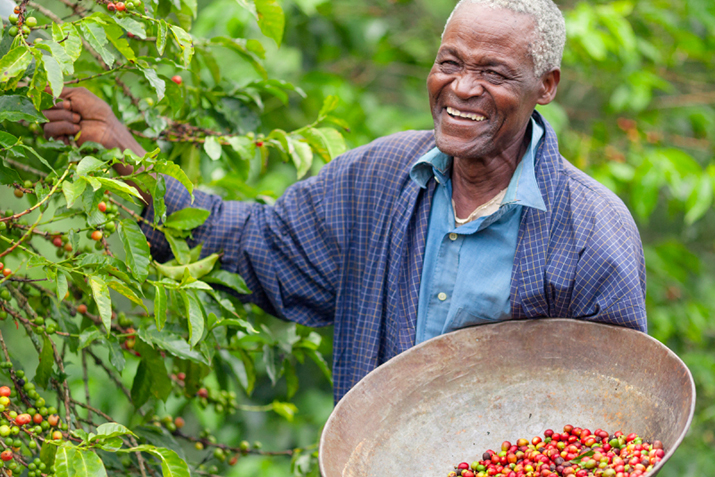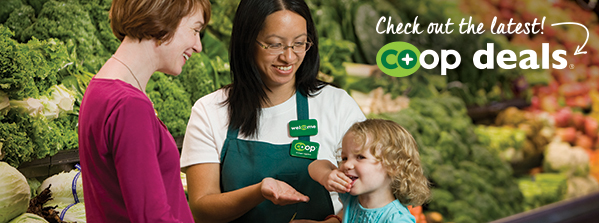Article
2020 Climate Award Winners Offer a Glimpse of the Future of Food

The 2020 National Co+op Grocers Climate Collaborative award winners are a reminder that every journey begins with a single step—a goal to reduce plastic, a commitment to foods that restore rainforests, a willingness to test climate-friendly farming methods and share what is learned. Natural product companies are taking the climate crisis seriously and demonstrating that the new definition of success lies beyond “business as usual.”
Food—how it is grown, produced, transported, used and thrown away—has a huge impact on our climate. Food co-ops are working together on a national level to organize and influence the natural products industry to prioritize climate action. National Co+op Grocers (NCG), a national co-op owned by food co-ops, is a pioneering supporter and participant in the Climate Collaborative, a coalition of companies with a shared goal of climate action.
In partnership with the Collaborative, NCG underwrites annual awards to identify and highlight inspiring stories of people taking bold, meaningful action within our food system to slow climate change. Check out this year’s National Co+op Grocers Climate Collaborative Award winners, selected from a pool of companies, co-ops and individuals nominated for innovation and excellence in climate leadership.
Outstanding Company Awards
Outpost Natural Foods: Plastic stops here
 If you find yourself in the Milwaukee area, pop into one of Outpost Natural Foods’ four locations and get a look at a grocery store that’s accustomed to being ahead of its time. Since 1970, this chain of cooperatively owned, community grocery stores has been serving up good food with reduced environmental impact. In the face of the climate crisis, they’re leading again with a new commitment to eliminate their use of petroleum-based single-use plastic in their stores by 2022. Their Plastic Purge staff committee is working to identify the scope of the task as well as potential solutions, and they’ve partnered with the Plastic-free Milwaukee Coalition and Wisconsin’s government to engage the community in their efforts. Meanwhile, their robust sustainability program focused on continuous improvement; the co-op offsets 101% of their store electricity use and in the past year alone, reduced their emissions by 13%.
If you find yourself in the Milwaukee area, pop into one of Outpost Natural Foods’ four locations and get a look at a grocery store that’s accustomed to being ahead of its time. Since 1970, this chain of cooperatively owned, community grocery stores has been serving up good food with reduced environmental impact. In the face of the climate crisis, they’re leading again with a new commitment to eliminate their use of petroleum-based single-use plastic in their stores by 2022. Their Plastic Purge staff committee is working to identify the scope of the task as well as potential solutions, and they’ve partnered with the Plastic-free Milwaukee Coalition and Wisconsin’s government to engage the community in their efforts. Meanwhile, their robust sustainability program focused on continuous improvement; the co-op offsets 101% of their store electricity use and in the past year alone, reduced their emissions by 13%.
Stonyfield Organic: Doing things yogurt never dreamed possible
 Want to gauge someone’s natural and organic creds? Whisper the word, Banilla and see what happens. You don’t have to recognize this iconic Stonyfield Organic yogurt flavor to know this beloved organic brand, of course. Stonyfield has a long history of environmental leadership that continues today with their new Science Based Target (SBT) to reduce emissions across their operations and value chain 30% by 2030. An SBT is an emission reductions target in line with Paris Climate Agreement goals to limit climate change to 1.5˚C, only a handful of businesses in the United States have committed to such a goal. Half of Stonyfield’s emissions come from agriculture, so they’re focusing on helping farmers improve soil health and increase carbon sequestration through the development of an open source online platform their farmers can access to collaborate and share success. Called OpenTEAM (Open Technology Ecosystem for Agricultural Management), the platform is projected to potentially help Stonyfield’s farmers sequester up to 1 ton of CO2 per acre—resulting in up to 70,000 tons of CO2 sequestered annually. Best of all, OpenTEAM will be shared widely with any farmers looking to transition to more climate-friendly soil health practices, propelling the entire industry forward. Stonyfield, we raise our cup of Banilla to you!
Want to gauge someone’s natural and organic creds? Whisper the word, Banilla and see what happens. You don’t have to recognize this iconic Stonyfield Organic yogurt flavor to know this beloved organic brand, of course. Stonyfield has a long history of environmental leadership that continues today with their new Science Based Target (SBT) to reduce emissions across their operations and value chain 30% by 2030. An SBT is an emission reductions target in line with Paris Climate Agreement goals to limit climate change to 1.5˚C, only a handful of businesses in the United States have committed to such a goal. Half of Stonyfield’s emissions come from agriculture, so they’re focusing on helping farmers improve soil health and increase carbon sequestration through the development of an open source online platform their farmers can access to collaborate and share success. Called OpenTEAM (Open Technology Ecosystem for Agricultural Management), the platform is projected to potentially help Stonyfield’s farmers sequester up to 1 ton of CO2 per acre—resulting in up to 70,000 tons of CO2 sequestered annually. Best of all, OpenTEAM will be shared widely with any farmers looking to transition to more climate-friendly soil health practices, propelling the entire industry forward. Stonyfield, we raise our cup of Banilla to you!
Outstanding Value Chain Awards
General Mills: One million regenerative acres by 2030
 Let’s talk about change. General Mills has been around since 1866—for context, the United States had just 35 states then. With a humble beginning as a flour mill on the banks of the Mississippi River, General Mills exemplifies industry’s ability to adapt to change. They weathered the Great Depression, two World Wars, the Great Recession—and now in the face of climate crisis, General Mills has made the largest commitment to developing and testing regenerative farming practices made by any company to date. The company plans to increase soil carbon sequestration rates on over 1 million acres of farmland by 2030—documenting every step to build a roadmap for others to follow. Home to beloved organic brands like Annie’s, Cascadian Farm and Muir Glen, General Mills has also been growing organic acreage in the United States and educating their customers about regenerative organic agriculture through limited edition items featuring regeneratively grown and perennial grains over the last two years. Now that’s 150 years of wisdom put to good use!
Let’s talk about change. General Mills has been around since 1866—for context, the United States had just 35 states then. With a humble beginning as a flour mill on the banks of the Mississippi River, General Mills exemplifies industry’s ability to adapt to change. They weathered the Great Depression, two World Wars, the Great Recession—and now in the face of climate crisis, General Mills has made the largest commitment to developing and testing regenerative farming practices made by any company to date. The company plans to increase soil carbon sequestration rates on over 1 million acres of farmland by 2030—documenting every step to build a roadmap for others to follow. Home to beloved organic brands like Annie’s, Cascadian Farm and Muir Glen, General Mills has also been growing organic acreage in the United States and educating their customers about regenerative organic agriculture through limited edition items featuring regeneratively grown and perennial grains over the last two years. Now that’s 150 years of wisdom put to good use!
Reusable packaging worth buzzing about: Hummingbird Wholesale
 What’s sweeter than pure Oregon wildflower honey? Wildflower honey delivered by bicycle in completely reusable packaging of course! Hummingbird Wholesale is known for their wide array of delicious and wholesome organic foods, delivered in reusable containers since 2003. Their innovative returnable packaging program has resulted in over 125,000 pounds of plastic containers and 93,000 pounds of glass containers reused (a 76% return rate overall)—making them a standout in the industry. Because of its demonstrated success over time, Hummingbird’s packaging reuse program proves it as a model other companies can replicate—representing the very best of what these awards are all about. Check out Hummingbird Wholesale’s impressive array of sustainability initiatives to find out what sweet program they’ll be buzzing about next!
What’s sweeter than pure Oregon wildflower honey? Wildflower honey delivered by bicycle in completely reusable packaging of course! Hummingbird Wholesale is known for their wide array of delicious and wholesome organic foods, delivered in reusable containers since 2003. Their innovative returnable packaging program has resulted in over 125,000 pounds of plastic containers and 93,000 pounds of glass containers reused (a 76% return rate overall)—making them a standout in the industry. Because of its demonstrated success over time, Hummingbird’s packaging reuse program proves it as a model other companies can replicate—representing the very best of what these awards are all about. Check out Hummingbird Wholesale’s impressive array of sustainability initiatives to find out what sweet program they’ll be buzzing about next!
Imlak’esh Organics: Superfoods from real rainforest superheroes
 Crunchier than a peanut, richer in omega 3 than a walnut, able to be tossed from hand to mouth in a single bound—it’s the superfood sacha inchi! Just one of the tasty rainforest snacks sold by Imlak’esh Organics and harvested as part of their master plan to restore the rainforests of Central America through agroforestry. One of the top agricultural climate solutions, agroforestry involves the growing of perennial crops, like sacha inchi and cacao, underneath the rainforest canopy, no need to destroy the forest. The method further lends itself to regenerative farming practices—which Imlak’esh supports financially. Working to transition cooperative farmers in coastal Ecuador to regenerative methods, Imlak’esh pays a regenerative premium—up to 12% higher than a fair trade, organic premium—aiming to fund 200 farmers’ transition to regenerative in 2020 and 350 more in 2021. Imlak’esh partners with the Regen Network to provide transparent, blockchain data to leave no doubt that the foods they sell are every bit as super as they say they are.
Crunchier than a peanut, richer in omega 3 than a walnut, able to be tossed from hand to mouth in a single bound—it’s the superfood sacha inchi! Just one of the tasty rainforest snacks sold by Imlak’esh Organics and harvested as part of their master plan to restore the rainforests of Central America through agroforestry. One of the top agricultural climate solutions, agroforestry involves the growing of perennial crops, like sacha inchi and cacao, underneath the rainforest canopy, no need to destroy the forest. The method further lends itself to regenerative farming practices—which Imlak’esh supports financially. Working to transition cooperative farmers in coastal Ecuador to regenerative methods, Imlak’esh pays a regenerative premium—up to 12% higher than a fair trade, organic premium—aiming to fund 200 farmers’ transition to regenerative in 2020 and 350 more in 2021. Imlak’esh partners with the Regen Network to provide transparent, blockchain data to leave no doubt that the foods they sell are every bit as super as they say they are.
Outstanding Influencer Award
Family Values: Ahmed Rahim and Reem Hassani of Numi Organic Tea
 Most families would count themselves lucky if they produced one visionary leader that helped change the world for the better—but the Rahim family produced two—brother and sister team Ahmed Rahim and Reem Hassani, cofounders of Numi Organic Tea. Their individual contributions to the company’s success are unique, but their shared integrity has made them international leaders in social responsibility and climate impact. Since 2011, Numi has offset over 4,000 metric tons of CO2e through renewable projects in India, China and the Amazon and they are currently advancing regenerative agriculture in their growing communities to sequester even more carbon. Ahmed is a co-founder of OSC2, a coalition of leaders from natural product industry who are committed to finding sustainable solutions for the most pressing issues facing our planet—from that organization the Climate Collaborative was born to focus specifically on climate change.
Most families would count themselves lucky if they produced one visionary leader that helped change the world for the better—but the Rahim family produced two—brother and sister team Ahmed Rahim and Reem Hassani, cofounders of Numi Organic Tea. Their individual contributions to the company’s success are unique, but their shared integrity has made them international leaders in social responsibility and climate impact. Since 2011, Numi has offset over 4,000 metric tons of CO2e through renewable projects in India, China and the Amazon and they are currently advancing regenerative agriculture in their growing communities to sequester even more carbon. Ahmed is a co-founder of OSC2, a coalition of leaders from natural product industry who are committed to finding sustainable solutions for the most pressing issues facing our planet—from that organization the Climate Collaborative was born to focus specifically on climate change.













